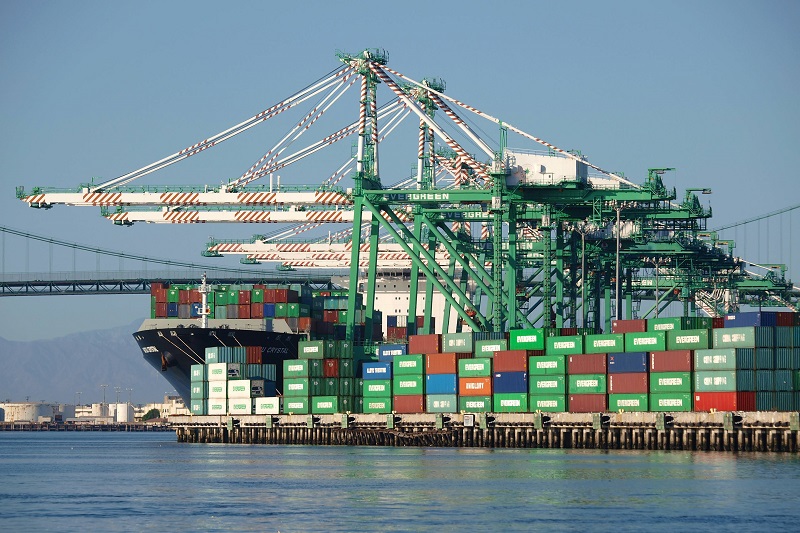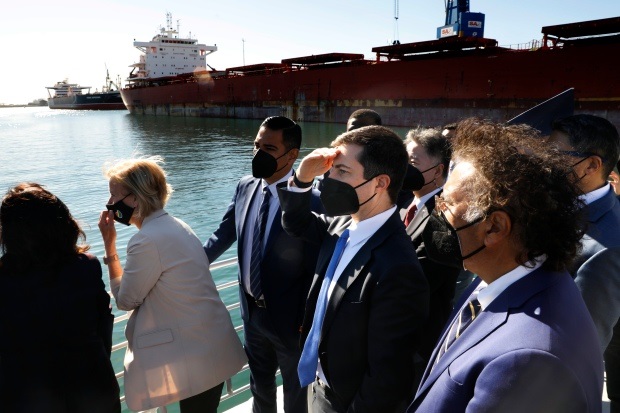Cargo Routed Away from West Coast Ports as Labor Union Contracts Expire
Keep all of the Biden administration visits to the Port of Los Angeles, Port of Long Beach and Port of Oakland in mind (aka the hide the ships program) as you review this pending issue with port labor unions. The labor union contracts expired at 5:00pm today. Massive wage increases, the result of inflation, are demanded by the unions and White House is likely to get involved (if they are not already).
 In a very weird economic scenario, the Biden administration actually benefits from a port stoppage as imports are a deduction to GDP and the U.S. economy is presumably on the “zero” growth bubble. If the Bureau of Economic Analysis (BEA) calculates a negative GDP in the second quarter (not likely for political reasons), the Biden administration would officially be responsible for a recession. [Any delay in import quantification helps shape the economic statistics; however, Q2 ended yesterday.]
In a very weird economic scenario, the Biden administration actually benefits from a port stoppage as imports are a deduction to GDP and the U.S. economy is presumably on the “zero” growth bubble. If the Bureau of Economic Analysis (BEA) calculates a negative GDP in the second quarter (not likely for political reasons), the Biden administration would officially be responsible for a recession. [Any delay in import quantification helps shape the economic statistics; however, Q2 ended yesterday.]
Additionally, port infrastructure specialist, John D. Porcari, is part of the Biden administration economic team. Porcari shaped the response to the import and supply chain crisis in 2021 that formed the hilarious ‘hide the ships’ strategy. Porcari works to prop-up the insufferable Transportation Secretary Pete Buttigieg who has no idea what he’s doing.
CALIFORNIA – LOS ANGELES, July 1 (Reuters) – The contract covering more than 22,000 workers at 29 U.S. West Coast ports expires late on Friday, dialing up worries that labor disruption could roil the nation’s battered supply chains, stoke inflation and threaten a weakening economy.
The International Longshore and Warehouse Union (ILWU) and the Pacific Maritime Association (PMA) employer group, which declined comment for this report, said in a rare joint statement on June 14 that they were not planning any work stoppages or lockouts that would worsen supply chain logjams.
That matters because when the contract expires at 5 p.m. PDT(0000 GMT Saturday), so does its “no strike” clause, said Peter Tirschwell, vice president of maritime, trade & supply chain at S&P Global Market Intelligence.
History suggests a last-minute extension is not likely. The union in November rejected a one-year contract extension, saying its members had already granted a three-year extension to the current contract.
[…] Meanwhile, wary shippers are not taking any chances. They are routing cargo away from the West Coast to avoid potential labor-related slowdowns, particularly at the nation’s busiest seaport complex at Los Angeles/Long Beach that handle nearly $500 billion in cargo annually. That is driving up their costs and contributing to backups at ports in New York/New Jersey, Savannah and Houston.
The last West Coast port labor contract negotiation broke down in 2015 after nine months of talks. Dockworkers stopped work for eight days, a move that gummed up U.S. supply chains and siphoned an estimated $8 billion from the Southern California economy.
U.S. President Joe Biden met with the ILWU and the PMA in Los Angeles on June 10.
Any disruptions at Pacific Coast ports that handle almost 40% of imports to the United States could send transportation costs even higher, exacerbating pressure on a softening economy that is sinking Biden’s approval ratings.
“We’ve never had a White House that is all over these negotiations the way they are now,” Tirschwell said. (read more)
Hmmm…. Opportunity knocks?
A labor union stoppage would be bad for the economy although statistically good for Biden, and any extended work stoppage would be an excuse for empty shelves, shortages and increased ‘demand side’ inflation that might surface. Huh, funny that.
Understand Operation Hide The Ships Here





Post a Comment